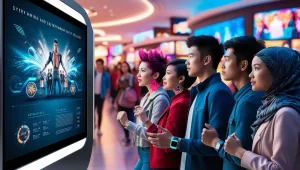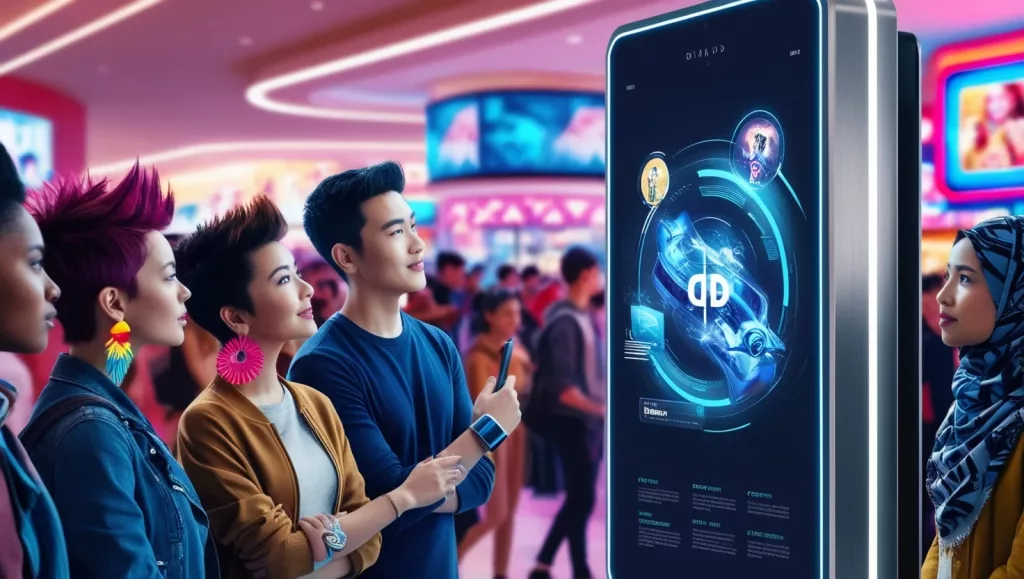How to Create Dynamic Visual Content for Your SMD Screen

In today’s digital landscape, creating captivating dynamic visual content for your SMD screen can make a significant difference in how your audience perceives your brand. Whether used for advertising, public information, or entertainment, dynamic visuals on LED displays not only grab attention but also engage viewers in a way that static images cannot. This article will guide you through the steps to create compelling SMD screen content that resonates with your audience and maximizes the impact of your LED display design.
Why Dynamic Visual Content is Crucial for SMD Screens
The visual appeal of dynamic content is what makes it stand out in a sea of static advertisements. With motion graphics, changing colors, and real-time updates, dynamic visuals capture the eye and hold attention longer than still images. On SMD screens, this content is even more effective because of the screen’s high brightness, sharp contrast, and ability to display high-definition visuals, making it the perfect medium for delivering dynamic messages.
Benefits of Using LED Display Design for Dynamic Visuals
By incorporating motion and animation, LED display design allows you to present content that is visually compelling. Dynamic content can convey more information in less time, ensuring that your message reaches the audience even in busy, high-traffic environments. It also enables businesses to update their messaging in real-time, ensuring relevance at all times.
Understanding SMD Screen Technology
SMD (Surface-Mounted Diode) screens are widely used in digital displays due to their ability to offer high-resolution visuals and vibrant colors. SMD screens differ from traditional LED displays by featuring compact, surface-mounted diodes, which allow for better image clarity and higher pixel density. This makes them ideal for dynamic visual content, where detailed images and smooth transitions are key to engaging viewers.
Key Elements of Engaging Dynamic Visual Content
To create compelling content for your SMD screen, consider these essential elements:
- High-Resolution Images and Videos: The sharper your visuals, the more likely they are to captivate your audience. Ensure your images and videos are high-resolution to match the capabilities of your SMD screen.
- Color, Motion, and Contrast: Bold colors and strong contrast help make your content pop, while smooth motion keeps the audience engaged. Avoid overloading your screen with too many colors or movement, as this can overwhelm viewers.
How to Design LED Display Content for Maximum Impact
When designing SMD screen content, it’s important to tailor your visuals to the specific size and resolution of your screen. Consider how your audience will view the content—whether they’re standing close to the screen or viewing it from afar. LED display design should focus on clear messaging, bold visuals, and simple layouts that are easy to digest at a glance.
Best Practices for LED Display Design
- Keep It Simple: Avoid cluttering your screen with too much information. Stick to short messages and impactful visuals.
- Use Bold Fonts: Fonts should be large, legible, and easy to read from a distance.
- Incorporate Movement: Movement naturally draws attention. Use animation to highlight key points without overwhelming the viewer.
Utilizing Animation in Dynamic Visual Content
Animation is one of the most effective tools for enhancing SMD screen content. Simple animations like moving text, fading transitions, or subtle background motion can add a dynamic touch that keeps your audience engaged. Remember, animation doesn’t need to be complex—a little movement can go a long way in making your content more visually stimulating.
Examples of Successful Animated Content on LED Displays
Consider the example of large outdoor LED billboards that use subtle motion to display changing ads. These displays often rotate between messages or animate text and graphics to create a sense of flow, keeping the audience’s attention without overwhelming them with rapid transitions.
Integrating Real-Time Data and Interactive Elements
Real-time data can take dynamic visual content to the next level. Whether it’s displaying live news feeds, weather updates, or social media interactions, integrating real-time information keeps your content fresh and relevant. Interactive elements like touchscreens or QR codes also allow users to engage directly with your display, making it a two-way communication tool.
Creating SMD Screen Content for Different Environments
Your content should be tailored to the environment in which your screen is placed. Indoor SMD screens might require more subtle visuals, while outdoor displays need bold, high-contrast content to stand out in bright sunlight. Additionally, consider the distance from which your audience will view the screen—content for close-up displays should feature more detail, while large outdoor screens need simple, clear messaging.
Incorporating Branding into Dynamic Visuals
Consistency is key when it comes to branding. Ensure your LED display design reflects your brand’s identity by using consistent colors, fonts, and logos. Your content should not only capture attention but also reinforce your brand message. This can help establish brand recognition and create a cohesive experience across different platforms.
The Importance of Readability and Font Selection
Choosing the right font can make or break the effectiveness of your SMD screen content. Ensure your text is large, bold, and readable from various distances. Sans-serif fonts typically work best for LED screens, as they offer clean lines and clear readability, even at a glance.
Balancing Simplicity and Creativity in Your Content
While creativity is essential for engaging your audience, it’s equally important to maintain simplicity. Overly complex designs can confuse viewers and dilute your message. Focus on one key point at a time, and use visuals to emphasize your message without overcrowding the screen.
How to Test and Optimize Your SMD Screen Content
Testing is crucial to ensuring your content performs well in its intended environment. Run A/B tests with different visuals to determine what resonates best with your audience. Additionally, use analytics tools to track engagement and optimize your content based on real-world interactions.
Using Dynamic Visual Content for Targeted Messaging
SMD screens allow you to tailor your messaging based on time of day, location, or audience. For instance, retail stores can use SMD screens to display different promotions during peak hours. By creating targeted messages, you can enhance audience relevance and drive more engagement.
SMDLED: Your Partner for High-Quality SMD Screen Solutions
For businesses looking to elevate their digital displays with dynamic visual content, SMDLED is your go-to provider. Offering a wide range of SMD screens across Pakistan, including in Karachi, Lahore, Islamabad, and more, SMDLED provides premium LED screens that deliver vibrant, high-resolution content. Visit their Products Page to explore their offerings, or check out their Manufacturer Page for more information about their cutting-edge technology.
Conclusion
Creating dynamic visual content for your SMD screen is key to capturing attention and engaging your audience. By focusing on clarity, animation, and branding, you can design SMD screen content that resonates with viewers and enhances your overall messaging. As LED display technology continues to evolve, businesses that invest in creative LED display design will have a competitive edge in delivering compelling visual experiences.
FAQs
- What makes dynamic visual content more effective than static content?
Dynamic content captures attention more easily through motion and real-time updates, making it more engaging. - How do I optimize my LED display design for outdoor use?
Use high-contrast colors, bold fonts, and simple messaging to ensure visibility in bright outdoor conditions. - Can small businesses afford to create dynamic content for SMD screens?
Yes, with affordable design tools and scalable screen options, even small businesses can create impactful dynamic content. - How often should I update my SMD screen content?
Regular updates keep your content fresh and relevant. Depending on your campaign, weekly or monthly updates may be ideal. - What tools are best for designing dynamic content for LED displays?
Tools like Adobe After Effects, Canva, and specialized LED design software are great for creating and optimizing dynamic content.
Looking for premium SMD screens and professional display solutions? SMDLED.PK is your trusted partner for state-of-the-art SMD technology. Explore our top-quality products like the stunning Leyard HDR 4K SMD Video Wall for crystal-clear visuals, the versatile MSA Plus SMD LED Screen Module, the sleek MSA Ultra Thin SMD LED Screen Module for modern setups, the durable MSG Outdoor SMD LED Screen Module, and the efficient MSG Indoor SMD LED Screen Module perfect for indoor environments.
We also offer exceptional Outdoor SMD Screens, Indoor SMD Screens, Flexible SMD Screens for creative designs, Cabinet SMD Screens for secure setups, Signpole SMD Screens for advertising, and stunning SMD Video Walls for large-scale visual impact. With SMDLED.PK, experience reliability, superior technology, and tailored solutions for all your display needs. Visit us today and transform your spaces with unparalleled visual excellence!


